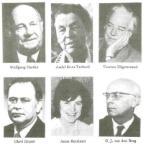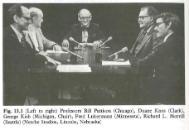 |
G01: Sigtuna: Cross-cultural perspectives on Geography
An international group of geographers - Aadel Brun-Tschudi (Norway), Olavi Grano (Finland). Wolfgang Hartke (W. Germany), Torsten Hägerstrand (Sweden), G. J. van den Berg (Holland) - share insights with Anne Buttimer on their own career experiences and engage in debate about the nature of and prospects for the discipline in the future.
Discussion Leader: Anne Buttimer
Language: English, German, Swedish, French.
Recorded at University of Uppsala, Sweden, June 1978.
Availability: Video, Transcript.
|
 |
G02: The environment of Graduate School in America
Marvin W. Mikesell (Chicago) chairs a discussion on environments for learning with Leslie Hewes, Preston E. James, Clyde F. Kohn and E. Cotton Mather. Each recounts his own experience of graduate school - as student, researcher, professor or chairman - in five major US departments: Chicago, Berkeley, Minnesota, Iowa, and Clark. They also discuss today's situation and offer suggestions regarding the ideal department of geography.
Language: English
Recorded at: NETCHE Studios, Lincoln, Nebraska, USA, April 1979.
Availability: Video, Transcript. (Courtesy of Longman Group Inc.).
|
 |
G03: American Geography in the 50's
Professor George Kish (Michigan) chairs a discussion with Duane Knos, Fred Lukermann, Richard L. Morrill, and William Pattison, on the changing nature of American geography during the critical decade of the 1950's. They describe the atmosphere of the post-war environment with specific reference to the departments of Michigan, Iowa, Minnesota, Seattle, and Chicago at a time when the so-called "quantitative wave" was burgeoning.
Language: English
Recorded at: NETCHE Studios, Lincoln, Nebraska, USA, April 1979.
Availability: Video, Transcript. (Courtesy of Longman Group Inc.).
|
 |
G04: An interview with Professor William William-Olsson
One of Sweden's most internationally-minded geographers here describes some enduring impressions from his childhood in the pre-WW I era, and the circumstances leading to his research on world population, urban development, and work in applied geography. He adds some reflections on human creativity and the philosophy underlying education today.
Interviewer: Anne Buttimer
Language: English
Recorded at: Royal Institute of Technology, Stockholm, Sweden, October 1982.
Availability: Video, Transcript.
|
 |
G05: An interview with Professor Karl Erik Bergsten
Two colleagues from the famous Institute of Geography at Lund University reminisce on personalities, events, and projects at that school. Bergsten, whose family for two generations have been teachers of geography, describes his own career experiences and shares his conviction that human and physical geography should not be separated, but unified.
Interviewer: Torsten Hägerstrand
Language: Swedish
Recorded at: University of Lund, Sweden, November 1978.
Availability: Video, Transcript.
|
 |
G06: An interview with Professor Wolfgang Hartke
The exciting story of a young rebel whose early experiences of voluntary exile in Switzerland and France evoked a keen sensitivity for special problems, particularly those of migrants and refugees. Hartke describes the challenge of re-establishing geography at Frankfurt and München after the war, and explains some of the background for his School of Social Geography at München.
Interviewer: Anne Buttimer
Language: French
Recorded at: Technischen Universitat, München, W. Germany, January 1979.
Availability: Video (French), Transcript (English). (Courtesy of Longman Group Inc.)
|
 |
G07: An interview with Professor T. Walter Freeman
A conversation between two friends, of different generations, but with common interests which range from the geography of Ireland to international trends in the history of geographic thought to the social implications of the Christian gospel. The interview shows how chance circumstances may offer to an historically-minded geographer unexpected opportunities in teaching and research.
Interviewer: Anne Buttimer
Language: English
Recorded at University of Manchester, England, February 1979.
Availability: Video, Transcript.
|
 |
G08: An interview with Professor Aadel Brun-Tschudi
Born in China of missionary parents, Brun-Tschudi experienced a range of personal and professional opportunities before becoming a geographer at Oslo. She shares reflections on education in general and speculates about geography's contribution to development studies and to promoting intercultural communication.
Interviewer: Christina Nordin
Language: English
Recorded at Norsk Rikskringkastning, Oslo, Norway, February 1979.
Availability: Video, Transcript.
|
 |
G09: An interview with Professor Torsten Hägerstrand
Internationally known for his work on migration, diffusion, time geography, and planning policy, Hägerstrand reviews some early influences on his thought and practice. He reflects on some high-lights of his own professional career, the dream and reality of applied geography, and problems regarding the directions facing the discipline today.
Interviewer: Anne Buttimer
Language: English
Recorded at: University of Lund, Sweden, May 1979.
Availability: Video, Transcript.
|
 |
G10: An interview with Anne Buttimer
Questions are posed regarding Buttimer's background education and values, and her perceptions of geography as a teaching and research field. She then explains some of the rationale and aims of the Dialogue Project and its potential contribution to cross-disciplinary and cross-cultural communication.
Interviewer: Christina Nordin
Language: English
Recorded at: University of Lund, Sweden, May 1979.
Availability: Video, Transcript.
|









